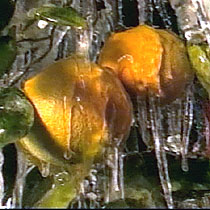2007年VOA标准英语-Deep Freeze Hits California Citrus Growers Hard(在线收听)
By Mil Arcega
Washington, DC
17 January 2007
watch Citrus Crop Problem report
California's Department of Food and Agriculture says the deep freeze that has already destroyed much of the state's citrus crop could go down as one of the worst in recent memory. Estimates for the 2007 harvest say losses could be in the hundreds of millions of dollars. That means higher prices for California produce and fewer jobs for farm workers.
 |
| Frozen oranges on California trees |
A.G. Kawamura says 2007 may even be worse than the three-day freeze in 1998, which destroyed 85 percent of California's citrus crop. "The general report was 70 or 80 percent of the crops still hanging in the trees, and in some of these areas, 100 percent has been lost. There will be small white crystals that will form in here and that will be a sign of frost damage."
Citrus grower Nick Hill sliced oranges to check for damage. He's been working day and night to save as much of his crop as he can. He sprays water to raise the ground temperature and runs large fans to keep the air circulating, but it is hard work he says. "Some people will go ahead and shut down, thinking their crop has been destroyed but I believe you got to keep running with this thing and evaluate later. You can't give up."
Before the cold snap, nearly one billion dollars worth of citrus fruit was still awaiting harvest.
But farmers say the damage is not limited to citrus. California grower Steve Barnard says his avocado farm was hit particularly hard. "This is the first real crop on this particular block and it's probably 90 percent gone."
For consumers, the 2007 deep freeze will mean higher prices. At the Los Angeles farmers market, the price of navel oranges has already jumped 50 percent.
By next month, citrus grower George McEwen predicts some fruits may be harder to find. "By the first of February you will see smaller displays of citrus and hopefully from our perspective, they're going to be more expensive."
Citrus grower Henry Vega says the crop losses will also be felt by workers who rely on farms for their income. "We have got about a thousand workers that we employ in our peak season. Some are between January and July and I would say that we are probably going to be affected. At least 30 percent of that is not going to be employed."
Much of the citrus grown in California is sold fresh for the domestic market but export demand has grown in Canada and Asia. Analysts say California's losses could mean higher prices for oranges grown in other countries.